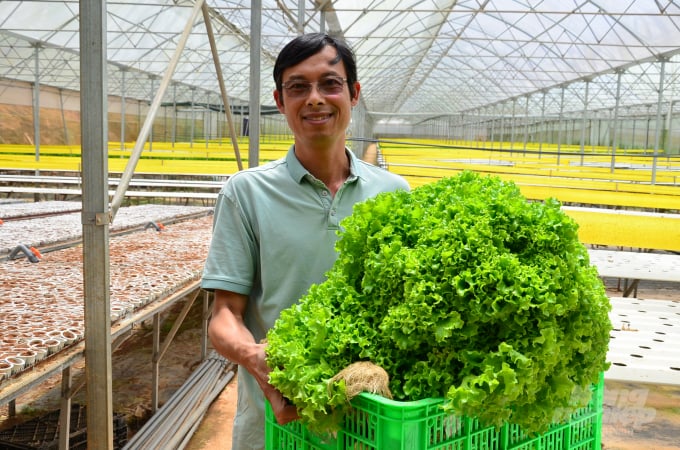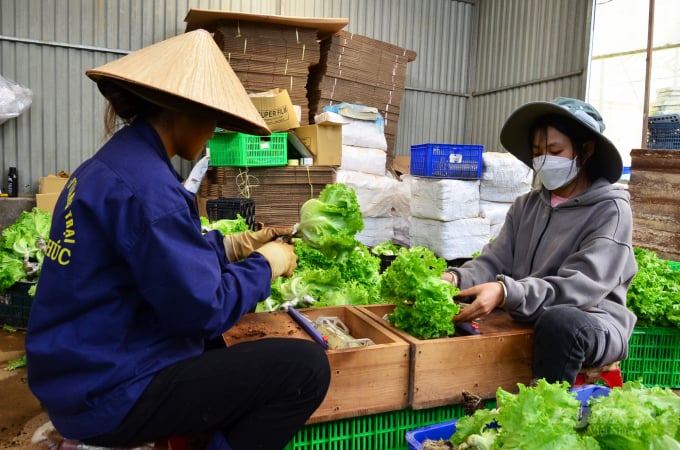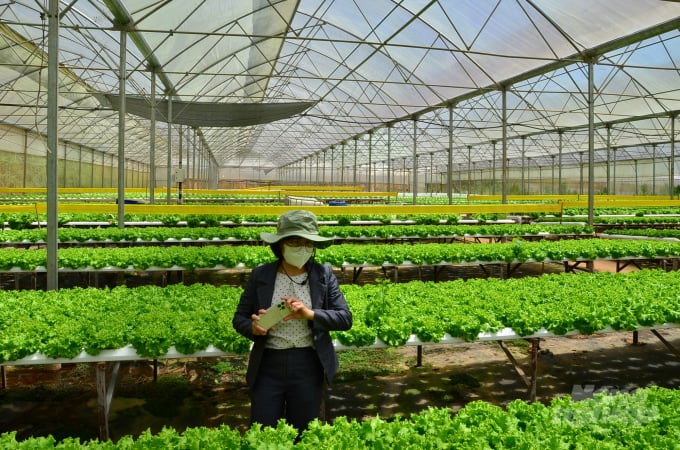May 24, 2025 | 16:27 GMT +7
May 24, 2025 | 16:27 GMT +7
Hotline: 0913.378.918
May 24, 2025 | 16:27 GMT +7
Hotline: 0913.378.918
Mr. To Quang Dung’s farm has six types of lettuce with distinct textures and flavors like that. Its name is Truong Phuc Farm, located in Da Sar commune, Lac Duong district, Lam Dong province. After eating for a while, the owner of the farm finally returned in a large pickup truck - a typical image of a farmer on the mountains and hills.

Mr. Dung and his harvested vegetables. Photo: Duong Dinh Tuong.
He was once a mechanic, working enough to make ends meet. But when he saw that it was difficult for human hands to catch up with the manual, a sudden thought appeared: if he kept pursuing a career in mechanics like that, both capital and strength would not last long. After some calculations, he decided to turn to agriculture.
In 2009 he leased some land, then started working and learning from seminars, experts and forerunners. Whenever he heard there was a seminar, he would go there at all costs. If it was near, he rode a motorbike. If it was far, he would take a plane. He even went to Malaysia twice to study at a demo farm. He approached hydroponic vegetable growing technology from there, and thus became one of the top pioneers in Lam Dong after setting up a farm in 2014.
The issue of food safety was a hot topic in Vietnam at that time. Dirty food or food of unknown origin could be exposed on the news everyday, making consumers lose faith in the market.
“The hydroponic vegetable production model is very suitable for the conditions of Lam Dong. The plants are completely isolated from the ground, so they are not infected with bacteria such as E.coli. Cultivation does not require plowing and the crops can be rotated continuously, hence my preference. I used to grow lettuce on the ground, getting only 7-8 crops per year, but when growing them in the hydroponic model, I can harvest up to 10-11 crops,” said Mr. Dung.

Packing the vegetables, ready to release. Photo: Duong Dinh Tuong.
He continued, “Starting as a stranger joining the field of cultivation, I simply produced then sold to traders, basically having no business relation. I wanted to take an active stance, because finding a place to sell the products after going through the trouble of buying input at a high price would be too passive. Having worked in agriculture means following the value chain, so in 2011 I got VietGAP certification and started marketing in Saigon, Da Nang, and Hanoi. First I produced on a small scale to provide for minimart systems. I only reached large supermarkets after expanding production.”

Mr. Dung’s polyhouse system. Photo: Duong Dinh Tuong.
Doing business with large supermarkets meant that the flow of goods could not be interrupted, output must also be stable, otherwise Mr. Dung would lose customers. The problem at that time was that agricultural production had to be like all other industries - continuous and unbroken.
"If you want to secure the daily output, you must have a good production process, seed, and organization. For example, my farm needs to produce 5,000-6,000 plants per day, so I have to calculate how many days to sow, how much I should sow, how many days to harvest, where to sell, and who to sell the products after harvest. All must be planned," said Mr. Dung.
The nature of agriculture is risks, even in greenhouses and polyhouses. Just like shrimp farming, when investing in hydroponic vegetables for the first 2-3 years, it seems very easy to succeed because the environment is clean, just drop the cup and the plants will live and wait for harvest, even without cleaning.
When investing in hydroponics, Mr. Dung thought the same and kept operating in that manner, not considering that the system was contaminated deep inside the pipeline after many years of use. The danger of bacterial infection in hydroponics was that regardless of where it exist, it would still circulate to the whole garden.

Mr. Dung's homemade heat autoclave to disinfect hydroponic vegetable growing tools. Photo: Duong Dinh Tuong.
“A seed cost VND 400, wages and substrate cost VND 1,000, and I had a scale of 200,000 cups like that. each batch of vegetables in 35 days was damaged 80-90%. The situation kept worsening. In 2018 I lost several billion VND. After studying a number of documents, I sent samples to universities for analysis of the causes, as well as asked the officers in the District Office of Agriculture and Rural Development to support and connect with laboratories. Only then did I hit the mark.
“Instead of using chemicals to kill bacteria and fungi, I use heat. I have self-made systems such as autoclaves. The cups are washed and put into the autoclave, after that I place the substrate in for the transplant. This method is very cheap but effective. The pump system used to serve the whole farm, but now I divide the farm into areas of 1,000 m2 each. I harvest vegetables in a rolling style and then continue to plant after cleaning the system," said Mr. Dung.
He also mentioned his insight: agricultural production now decides win or lose at the market making stage. Mr. Dung monitors the market daily, regularly exchanges with customers to see how consumption habits change. He showed me a text message in English with a Korean customer. He said that recently due to market price fluctuations, including a very high increase in fertilizer and logistics costs, he negotiated with a Korean customer to raise the price.
Working on the farm during the daytime, and twice a week in the evening, Mr. Dung goes to an English center to study. Continuously for nearly 2 years, his whole family has all learned English to be able to conduct international trade.
“My main purpose is still learning to improve the value of my products. For example, one bag of manure 10 years ago cost VND 200,000, now it is over 1.5 VND million. One cabbage 10 years ago was sold for VND 10,000, if we still sell it for VND 10,000 now, there would be no profit. If farmers do not update their knowledge to increase the value of their products, it is clear that they cannot survive. Therefore, you must always be ready to study, study for hours, study every day.”
Translated by Samuel Pham

(VAN) The People's Committee of Tra Vinh province has approved an adjustment to the investment policy for the Green Hydrogen Plant project, increasing its area to approximately 52.76 hectares.
![Reducing emissions from rice fields: [2] Farmers’ commitment to the soil](https://t.ex-cdn.com/nongnghiepmoitruong.vn/608w/files/news/2025/05/05/dsc08881jpg-nongnghiep-140632.jpg)
(VAN) Clean rice cultivation model in Thuong Tan commune, Bac Tan Uyen district, is assisting local residents in achieving sustainable agriculture by substantially reducing costs, increasing productivity, and protecting the environment.

(VAN) At the conference to disseminate Resolution No. 68, AgriS introduced its digital agricultural ecosystem and reaffirmed its commitment to accompanying the Government in promoting private sector development and sustainable agriculture.

(VAN) 'Blue Ocean - Blue Foods' initiative is designed to restore marine ecosystems and establish sustainable livelihoods for local communities by cultivating a minimum of 1,000 hectares of cottonii seaweed in the first three years.
/2025/05/21/4642-3-112707_603.jpg)
(VAN) The V-SCOPE project has made direct contributions to three out of six pillars of the Comprehensive Strategic Partnership between Vietnam and Australia.

(VAN) Facing the threat of rabies spreading to the community, Gia Lai province urgently carries out measures to vaccinate dogs and cats on a large scale.

(VAN) Disease-free livestock farming not only protects livestock herds but also stabilizes production and livelihoods for many farmers in Tuyen Quang.